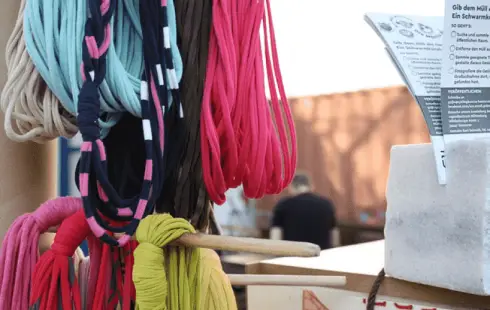
Custom T-Shirts: Last-Minute Gifts They'll Actually Love
Section: Arts
 Bavaria's business landscape is optimistic about the opportunities presented by textile recycling and the establishment of a circular textile economy within the region. A groundbreaking study, supported by the Bavarian Ministry of Economic Affairs, the Association of Bavarian Industry (vbw), and the Bavarian Association of Textile and Clothing Industry (VTB), titled "Economic Potentials of Textile Recycling and Hydrogen Production from Textile Waste in Bavaria," has meticulously analyzed and evaluated various recycling processes.
Bavaria's business landscape is optimistic about the opportunities presented by textile recycling and the establishment of a circular textile economy within the region. A groundbreaking study, supported by the Bavarian Ministry of Economic Affairs, the Association of Bavarian Industry (vbw), and the Bavarian Association of Textile and Clothing Industry (VTB), titled "Economic Potentials of Textile Recycling and Hydrogen Production from Textile Waste in Bavaria," has meticulously analyzed and evaluated various recycling processes.
Addressing the Concerns
Hubert Aiwanger, the Minister of Economic Affairs, emphasized the significant impact of textiles, particularly fast fashion, which contributes significantly to waste generation. Seeking economically and ecologically sensible solutions in textile recycling is crucial. The study represents pioneering work that provides an excellent overview of textile waste generation and potential avenues for valorization. It has revealed insights like the current infeasibility of producing hydrogen from used clothing. Nevertheless, Bavaria stands a chance to become a model region for the circular textile economy and is well-prepared for the forthcoming sustainable and circular textile strategies proposed by the European Union.
Mapping the Path Forward
One of the study's key achievements was the first-ever comprehensive data collection of existing and projected mass flows of used textiles. This information can guide Bavarian enterprises in making informed decisions about investments in textile waste processing and implementing industrial solutions. The study's spatial analysis identified the Augsburg metropolitan area along the A8 motorway as having a favorable infrastructure in terms of waste generation, logistics, research, and industrial competencies, making it an ideal location for building a circular textile economy.
Collaborating for Success
Bertram Brossardt, CEO of vbw, highlighted the immense potential in combining environmental technologies, such as recycling, with Bavaria's strengths in automation and artificial intelligence. He sees this as a pathway to a successful circular economy, elevating Bavaria as a leader in sustainability and enhancing its competitiveness. However, he stressed the necessity of creating the right framework for innovation, particularly at the EU level.
Stefan Satl, CEO of VTB, emphasized that Bavarian textile and clothing companies, mostly consisting of small and medium-sized enterprises, prioritize sustainability and resource conservation over fast fashion. The study outlines how Bavaria can establish an on-site textile recycling system that aligns with the preferences of local businesses. Achieving this vision will require targeted support measures alongside innovative technological concepts and close collaboration between the business sector and research institutions.
Considering Hydrogen Production from Textile Waste
A significant aspect of the study was the examination of whether textile waste could contribute to industrial-scale hydrogen production in Bavaria. According to Prof. Dr. Wolfgang Rommel, Managing Director of bifa Environmental Institute, the projected annual hydrogen demand in Bavaria by 2030 is around 10 terawatt-hours. However, non-recyclable textile waste can only provide about 0.2 terawatt-hours of hydrogen. Therefore, at present, hydrogen production from textile waste is not feasible, given the current market conditions. The study reinforces the importance of investing in advanced collection systems and material recycling technologies while prioritizing waste reduction. The extended lifespan of textile products and their reuse should be enhanced for a successful and economically viable circular textile economy, and innovative sorting technologies for clothing textiles need development.
Embracing Research and Collaboration
The study delved into various recycling technologies at different stages of development, complementing each other and offering potential areas for optimization through further research. Prof. Dr. Stefan Schlichter of the Augsburg University of Applied Sciences highlighted the role of competence centers, like the Recycling Atelier Augsburg, in deriving practical implementation perspectives for waste management, textile, and clothing industries.
Sharing Knowledge for Collective Progress
Through the TEXTILE INNOVATION network at Bayern Innovativ, research findings will be shared with the industry. The study will be presented at the Textile Innovativ Symposium on July 18, 2023, in Augsburg. Members of vbw and VTB will also have access to the study. Minister Aiwanger expressed the intention to bring together science, the textile industry, and waste management, aiming to leverage the study's insights for innovative solutions in practice.
Accessing the Study
The comprehensive study is available for download from the websites of bifa and ITA Augsburg:
ITA Augsburg: [https://ita-augsburg.com/projekte/trec-studie/]
In conclusion, the study on textile recycling and circular economy potentials serves as a milestone for Bavaria's sustainable future. With proactive collaboration between stakeholders, the region can pave the way for innovative solutions that benefit the environment and bolster economic growth in the long run.
Original article translated and rewritten from VTB Bayern.

Section: Arts

Section: Arts

Section: Business

Section: Business

Section: Arts

Section: Health

Section: Arts

Section: News

Section: News

Section: Arts
Health Insurance in Germany is compulsory and sometimes complicated, not to mention expensive. As an expat, you are required to navigate this landscape within weeks of arriving, so check our FAQ on PKV. For our guide on resources and access to agents who can give you a competitive quote, try our PKV Cost comparison tool.
Germany is famous for its medical expertise and extensive number of hospitals and clinics. See this comprehensive directory of hospitals and clinics across the country, complete with links to their websites, addresses, contact info, and specializations/services.
One of the most beautiful squares transforms into a summer stage every year for two days. The Gärtnerplatz Open-Air features a free music and cultural program across three stages, as well as street food from local vendors. On Saturday, the main stage at Gärtnerplatz offers something for everyone,...



No comments yet. Be the first to comment!